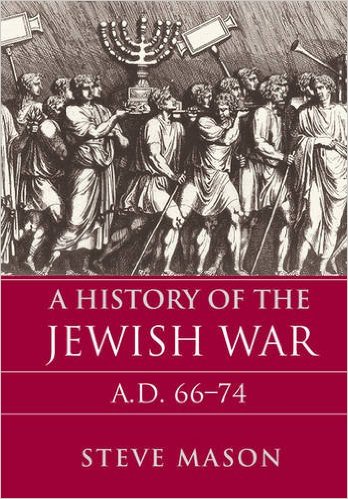 Gentle reader, you must promise not to tell my wife what I am about to confess to you. Yesterday I threw thrift behind me and recklessly purchased an electronic copy of A History of the Jewish War, AD 66-74 by Steve Mason. And I do not regret the guilty pleasure.
Gentle reader, you must promise not to tell my wife what I am about to confess to you. Yesterday I threw thrift behind me and recklessly purchased an electronic copy of A History of the Jewish War, AD 66-74 by Steve Mason. And I do not regret the guilty pleasure.
Extremely rare among historical works we tend to associate with topics related to biblical studies, this work is written by an author who clearly understands what history is and how to use historical sources. Steve Mason laments his publisher’s insistence that he remove an entire chapter explaining all of this to an audience he acknowledges will belong primarily to departments in “religious studies, Jewish studies, archaeology, biblical studies, or theology.” He knows that
If even those who understand themselves to be historians and nothing else differ significantly in method, the potential for disagreement over aims and methods is likely to be all the greater in this field. On top of that lie all the potential stakes in this period held by Jews and Christians of various kinds, religious and non- and anti-religious scholars, Zionists, post-Zionists, and anti-Zionists.
So the excised chapter was replaced by a shorter discussion in his second chapter, and I would love every biblical scholar and theologian who thinks she or he is a historian yet who has never read R.G. Collingwood or E.H. Carr. Too often I have seen a theologian mocking what he calls an old positivist view of history yet ironically failing to realize that he only has a superficial grasp of what historical positivism really is. I myself have been lampooned for discussing the problems raised by E.H. Carr for historians by theologians who only know that Carr had communist sympathies and accordingly seem to think that anyone who refers to him must be seeking to undermine every good and decent value in modern society.
But here is Steve Mason discussing the problems facing historians as they are addressed by Carr.
To get to the point: Mason explains the importance of first knowing and understanding what our sources actually are. A historian cannot simply read Josephus, for example, at face value. One must understand the type of world that had produced him and the type of writing he has given us. One must understand the worldview he shares with his contemporaries. And one must understand why he wrote the way he did and what he did.
Moreover, one must understand what history is and what it is not. The past is dead. It is gone. It no longer exists. So how can we know anything about the past?
The past is not a set of facts that exist “out there” and that the historian can look at and talk about. The past really is dead. It is not preserved in some sort of hologram or series of floating imprints for our imaginations to look at and learn.
What we read in history books are the creations of historians. Creations.
I hesitate to use the detective analogy because it has been done to death before even though it is very often misapplied or misunderstood or not understood nearly well enough.
But in one sense history really is like detective work in that it seeks to understand what happened/a crime — who, how, what — from whatever bits and pieces left at the scene might be able to convey. That sounds banal, but the principle is not often understood among many historians tied to theology and biblical studies. Here is the difference:
All detectives start with some known facts that are indisputable. A cadaver with a knife in its back, a diary of a missing heiress, invoices and tax records. They then seek to uncover more evidence from these established facts. Interviews are recorded and attempts are made to independently corroborate them, etc.
But if detectives work like historical Jesus scholars they would not work like this at all. They would read a few popular anonymous publications about a long-ago murder at a nearby uninhabited hill that locals believed to be haunted. They would dismiss most of the anecdotes about hauntings, but they would study the publications to try to determine who the murder victim was and what was the motive for his murder.
That’s from an older post of mine.
In other words, far more often than not, scholars familiar only with biblical studies all too often do not understand the relationship between their sources, the events narrated in them, and what really happened.
Steve Mason, at least as far as I have read since yesterday, does understand. I feel like I am reading the work of a “real historian” so rare in this particular field of research.
I hope to be able to share my guilty pleasure over coming months and longer as time and opportunity are both kind to me.

